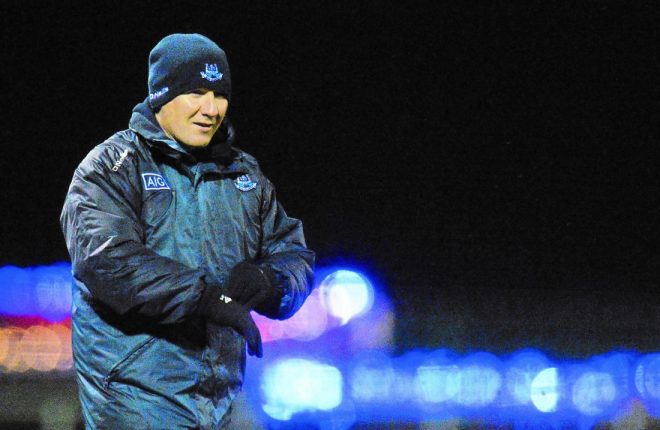
Jim Gavin possesses the ten habits of a great manager
Fans talk about great teams and great players but what about great coaches or more importantly highly effective coaches? Consider these GAA coaches; Jim McKeever, Joe Lennon, Dessie Ryan, Kevin Heffernan, Sean Boylan, Joe Kernan, Mickey Harte, Jim McGuinness, Jim Gavin, Brian Cody. Then consider Bill Shankly, Brian Clough, Alec Ferguson from soccer, Clive Woodward from rugby and John Wooden from basketball.
The great philosopher Aristotle said, “We are what we repeatedly do. Excellence, therefore is not an act but a habit.”
Across all sport, it’s reckoned that highly effective coaches have ten habits (usually done daily):
1. Make training more challenging and more demanding than the competition your players are targeting – Realising ‘competition’ is not the time to find out player limits. Thus training needs to be more challenging/demanding – physically, mentally, technically, tactically, emotionally – than the competition games your players are due to perform in. For example, for tennis play six sets of nine games against four different opponents instead of five sets of six games against one opponent, eg, for Gaelic instead of a one hour game, play 4×25 minute games with full teams; then a man short/extra; then swap forward lines and finish with ‘targeted’ game of nine seconds to score and six seconds to win the ball back.
2. Learn and develop as a coach at a faster rate than your players – ‘H.E.’ coaches know success is a moving target and to stay relevant they must be committed to life-long learning, honest personal and professional evaluation and continuous improvement. So, whatever your sport invite/hire top class coaches (one or two), who have already won the competition you aim for, to come in to review your coaching and programme regularly to raise the quality of your coaching.
3. Accelerate your rate of learning faster than your opposition – With the internet today, there are no secrets in sport. Everybody knows what you know. Any info is free, any time, anywhere. So learn loads more every day, stay ahead of your rivals, eg, spend time (weeks/month at the end of every season travelling (local/world), to observe their sessions, milking their brain and so enhance your rate of learning/development to higher levels.
4. Enhance your creative thinking skills – Creativity is the defining difference between the good and the great coach. Good coaches follow programmes, the great invent winning programmes and so create new directions/ideas which can change their sport. Copying kills, so don’t follow others to try and duplicate their success as this is a recipe for failure. Do, in the close season, enrol in any type of creative class, eg, creative writing, yoga, piano, guitar, comedy. This will enhance your capacity to create and understand creativity.
5. Individualise your coaching within your team – ie, coach the ‘individual’. There are no true team sports. Each moment is player on player and given the quality of performance analysis now, every player’s strengths/weaknesses are known by opponents. Highly effective coaches engage players to inspire them to consistently prepare with passion to reach their full potential. As coach, before and after, or as a designated ‘skills’ coach during training session hold 10 minutes ‘one-to-one clinics with individual players. Can you conduct a one-to-one clinic?
6. Ensure that every player you work with ‘out-prepares’ (in every aspect) their opposition – So they can play very well, at speed, under fatigue, under pressure consistently in championship conditions. To be best prepared in skills, attitude, conditioning, sleep, travel management, nutrition, hydration, etc. So train players how to shop, plan, cook their own meals/fluid, how to get proper sleep, travel planning, etc. See it, be it.
7. Adapt training plans/programmes to optimise their impact on each individual player at every session – H.E. coaches plan meticulously with great attention to detail to ensure understanding of the ‘purpose’ of every session so that players train in an optimal environment and opportunity preparation mode. So publish and post in dressing room each session and leave photocopies for each player. Make sessions varied and attendant to strengths to be worked on and weaknesses to be fixed.
8. Promote performance practice (not practice makes perfect) – Want to master a skill? Coaches will adopt the practice makes perfect approach. Want to master a skill so that it’s executed the right way/at right time/in competition, ie, well, at speed, under fatigue, under presure consistently in championship conditions. H.E. coaches follow ‘performance practice’ eg, try these three methods.
(i) Teach the skill basics in under two minutes. (ii) Allow players to learn the skill by doing/feeling it. (iii) From 13 years up, practice skills as close to game speed/pressure/intensity ASAP.
9. Adopt an integrated, multi-disciplinary approach to talent development and performance enhancement – ie, treat your players as humans and not just players and prepare them to be all they can be, eg, find things out about your players away from your sport. Treat them as you would want to be treated. Arrive early at training to greet each one, talk to each one a week about family, studies, work, pets, hobbies, etc. Take each regularly for one-to-one clinics re your sport. Do all this and watch how performance improves.
10. Lead – Great coaches are leaders – so be different. Do things others won’t. Drive change. Thrive in creative conflict situations. Fight for who/what you want. Take risks. Be comfortable talking about winning. Be a proud individual and be unique. Be prepared to lead while accepting the responsibilities of leadership.
– Sounds like the coaches I mentioned as I began this article. Yes, they are highly effective coaches.
Receive quality journalism wherever you are, on any device. Keep up to date from the comfort of your own home with a digital subscription.
Any time | Any place | Anywhere











